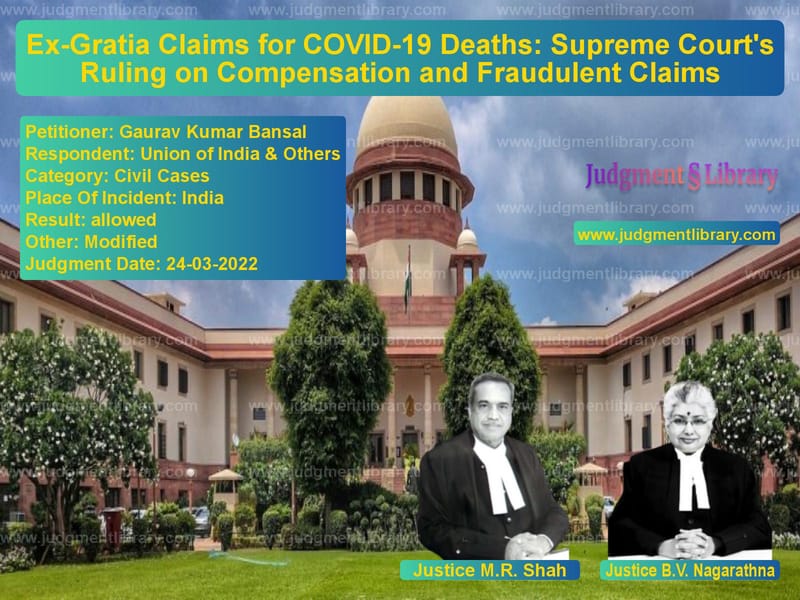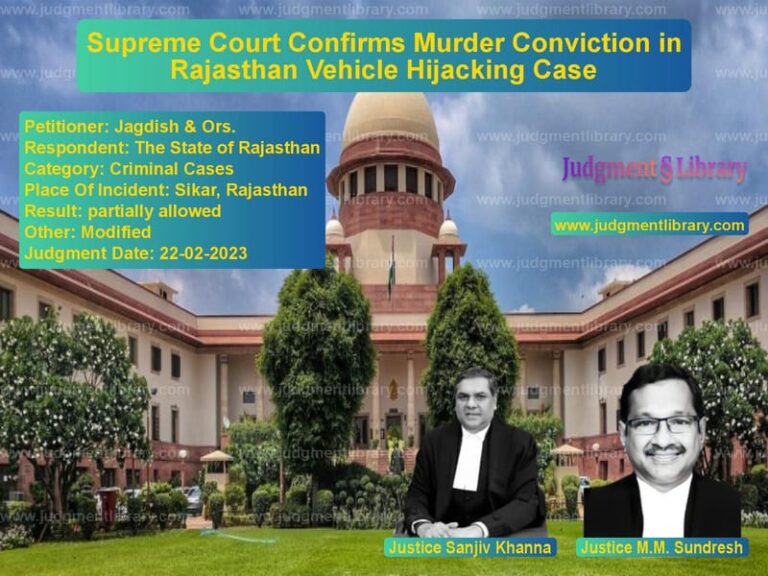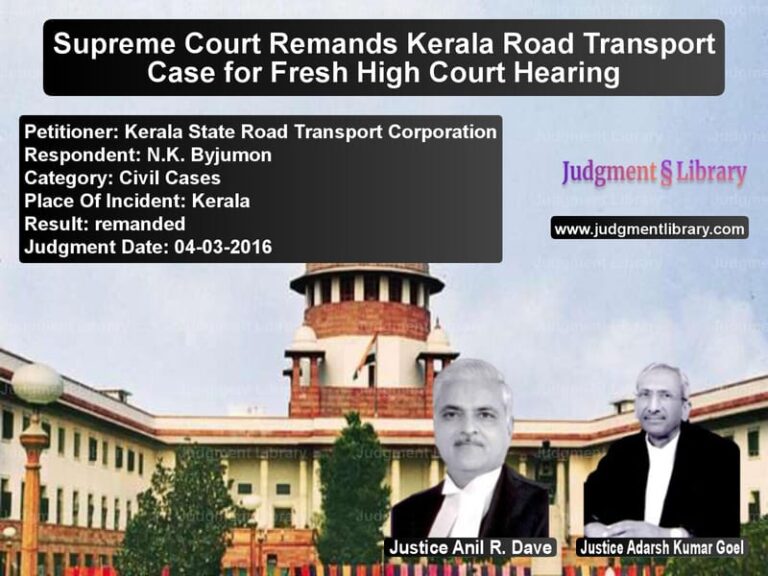Ex-Gratia Claims for COVID-19 Deaths: Supreme Court’s Ruling on Compensation and Fraudulent Claims
The case of Gaurav Kumar Bansal vs. Union of India & Others revolves around the issue of ex-gratia compensation for families of those who died due to COVID-19. The Supreme Court had to determine the final deadline for submitting compensation claims, the necessity of sample scrutiny for detecting fraudulent claims, and the legal consequences for individuals submitting false claims.
Background of the Case
The matter originated from a series of orders passed by the Supreme Court regarding ex-gratia payments for families of COVID-19 victims. The Court, in its order dated June 30, 2021, had directed the government to provide Rs. 50,000 as ex-gratia compensation to the kin of each person who died due to COVID-19. However, concerns arose regarding potential fraudulent claims, leading to the government’s request to modify the previous orders.
The Union of India (Ministry of Home Affairs) filed an application seeking:
- Modification of the Court’s previous orders to allow sample scrutiny of claims to verify authenticity.
- Setting a final deadline for submitting claims to prevent an indefinite flow of applications.
The Solicitor General of India, Tushar Mehta, argued that by now, most genuine claimants had applied, and continuing the process indefinitely could result in fraudulent claims.
Petitioner’s Arguments (Gaurav Kumar Bansal)
The petitioner opposed the government’s request, arguing:
- The families of COVID-19 victims were still suffering, and setting a strict deadline would deprive some eligible claimants of their rightful compensation.
- Many families, particularly those from rural and marginalized communities, were unaware of their right to claim compensation and needed more time.
- While fraud prevention is important, excessive scrutiny could lead to denial of legitimate claims.
Respondent’s Arguments (Union of India)
The government argued:
- Over 7,38,610 claims had already been received by various state governments.
- Without a deadline, fraudulent claims could increase, and the process would become unmanageable.
- There was evidence of false claims being filed in some states, warranting random scrutiny.
- Section 52 of the Disaster Management Act, 2005 makes filing fraudulent claims a punishable offense.
Supreme Court’s Observations
The Supreme Court analyzed the concerns of both parties and ruled:
- Setting a deadline for filing claims was necessary but needed to be reasonable.
- Four weeks, as suggested by the government, was too short. Instead, the Court provided 60 days for families to submit claims for deaths that occurred before March 20, 2022.
- For future COVID-19 deaths, families would have 90 days from the date of death to submit a claim.
- The compensation process must be completed within 30 days of receiving an application.
The Court also agreed that fraudulent claims were a serious concern and directed:
- A random sample scrutiny of 5% of the claims in Andhra Pradesh, Gujarat, Kerala, and Maharashtra as a pilot study.
- If fraudulent claims were detected, further scrutiny could be conducted.
- Authorities must take strict action against individuals submitting false claims under Section 52 of the Disaster Management Act, 2005.
Final Judgment
The Supreme Court ruled:
- The deadline for claims was fixed at 60 days from the date of the judgment for deaths occurring before March 20, 2022.
- For future deaths, claims must be submitted within 90 days of the date of death.
- A random scrutiny of 5% of claims in four states would be conducted to detect fraudulent applications.
- Fake claims would be prosecuted under Section 52 of the Disaster Management Act, which provides for imprisonment up to two years and a fine.
- The government was directed to conduct wide publicity of the deadlines through print and electronic media so that all eligible claimants were informed.
Key Takeaways from the Judgment
- Final Deadline for Claims: Families of COVID-19 victims must file their claims within the prescribed time limit to avoid disqualification.
- Scrutiny of Fraudulent Claims: The government is authorized to conduct sample scrutiny and take action against those submitting false claims.
- Quick Processing of Claims: Authorities must ensure claims are processed and compensation is disbursed within 30 days.
- Public Awareness: The government must take steps to inform the public about deadlines to prevent eligible claimants from missing out.
- Legal Consequences of Fraud: Filing false claims is punishable under the Disaster Management Act, ensuring that only genuine victims receive compensation.
Conclusion
This Supreme Court ruling balances the need for timely relief for families affected by COVID-19 with the prevention of fraud. The judgment ensures that compensation is provided efficiently while putting safeguards in place to prevent misuse. The decision sets a precedent for handling large-scale ex-gratia payments during disasters and public health emergencies.
Read also: https://judgmentlibrary.com/supreme-court-upholds-specific-performance-in-land-sale-dispute/
Petitioner Name: Gaurav Kumar Bansal.Respondent Name: Union of India & Others.Judgment By: Justice M.R. Shah, Justice B.V. Nagarathna.Place Of Incident: India.Judgment Date: 24-03-2022.
Don’t miss out on the full details! Download the complete judgment in PDF format below and gain valuable insights instantly!
Download Judgment: gaurav-kumar-bansal-vs-union-of-india-&-oth-supreme-court-of-india-judgment-dated-24-03-2022.pdf
Directly Download Judgment: Directly download this Judgment
See all petitions in Damages and Compensation
See all petitions in Contract Disputes
See all petitions in Specific Performance
See all petitions in Public Interest Litigation
See all petitions in Legal Malpractice
See all petitions in Judgment by Mukeshkumar Rasikbhai Shah
See all petitions in Judgment by B.V. Nagarathna
See all petitions in allowed
See all petitions in Modified
See all petitions in supreme court of India judgments March 2022
See all petitions in 2022 judgments
See all posts in Civil Cases Category
See all allowed petitions in Civil Cases Category
See all Dismissed petitions in Civil Cases Category
See all partially allowed petitions in Civil Cases Category







